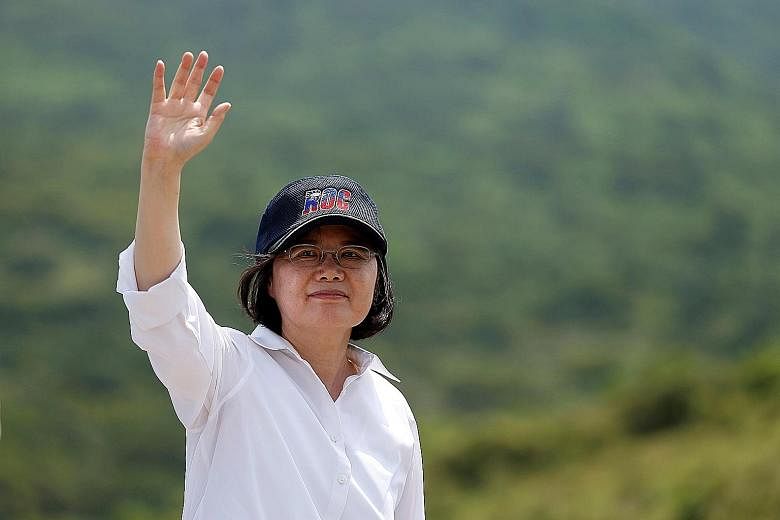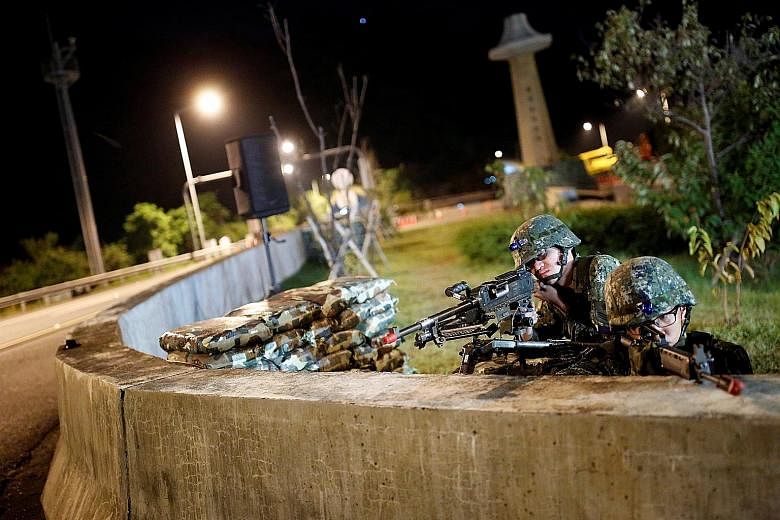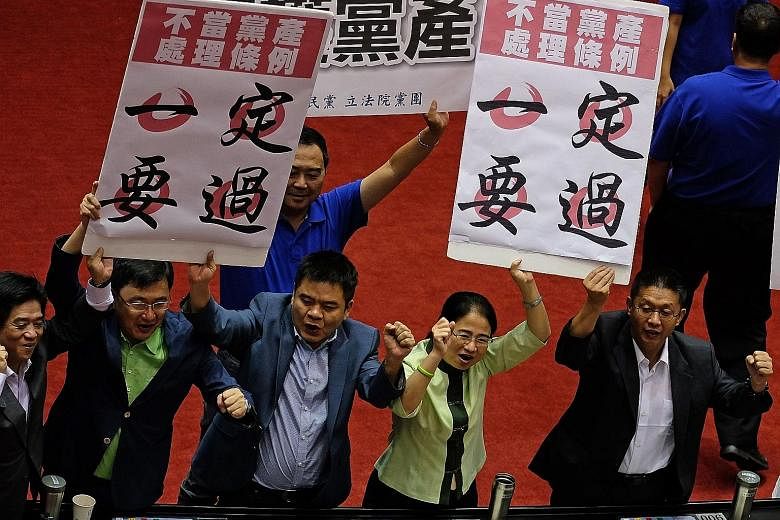President Tsai Ing-wen today marks her first 100 days in office as Taiwan's first female leader. She won the January presidential election handsomely with 56 per cent of the popular vote on the back of strong expectations from the people and took office on May 20. In her inauguration speech, Ms Tsai promised to introduce reforms to boost a moribund economy, improve the social safety net and better prepare Taiwan's youth for the future.
But the sheen has begun to wear off. Recent public opinion polls show that less than half of the population is satisfied with her work as opposed to 57 per cent when she took office in May. At the same time, her disapproval rating has risen to about 40 per cent from 16.3 per cent in May, according to a recent poll by Taiwan Indicators Survey Research.
Observers say Ms Tsai's report card is mixed - her ability to bring a swift end to the first industrial action by cabin crew in Taiwan's aviation history was offset by her Cabinet's policy flip-flop on a new five-day work week.
Associate Professor Jonathan Sullivan of the University of Nottingham said Ms Tsai has had to balance the concerns of multiple constituencies, domestically, internationally and within her own party, leading to a very cautious start to her presidency. This, he added, "has not endeared her to voters hoping for quick, progressive reforms".
Taiwan Correspondent Jermyn Chow takes a look at how well Ms Tsai has fared so far.
Cross-strait ties
Icy ties after not noting Consensus
Taiwan's relations with China turned chilly after Ms Tsai in her inauguration speech failed to mention the 1992 Consensus. This was a tacit agreement between Beijing and the then Taiwan government that there is "one China", with the two sides differing on what that means.
It was the basis for warm and stable cross-strait ties under Ms Tsai's predecessor Ma Ying-jeou.
Instead, she said that she respected the "historical fact" that a meeting took place in 1992 at which the two sides sought common ground. She also said she would conduct cross-strait ties in accordance with the island's Constitution, which contains the concept of "one China".
But this was not good enough for Beijing, which insisted that the 1992 Consensus must be the basis for stable, peaceful ties, and halted official channels of communications.
China has also reportedly cut the quota of Chinese tourists travelling to Taiwan, putting a squeeze on the island's tourism industry.
This, and the fact that two-thirds of the island's overseas investments and 40 per cent of its exports go to China, have made Taiwanese anxious over the cross- strait chill.
Newspaper Apple Daily yesterday published a survey in which half of those polled said they are unhappy with how Ms Tsai is conducting cross-strait relations.
Defence
Promise of drastic reforms
Amid the growing cross-strait chill, questions have been raised about the preparedness of Taiwan's military in the event of an invasion by China.
These come after a series of incidents that point to problems within the armed forces. They include cyber security breaches and the misfiring of an anti-ship missile.
Ms Tsai, who has spoken on the need for "drastic" reforms in the military, on Thursday announced that the reforms will be rolled out next year and that equipment upgrades will be undertaken as soon as possible. Dr Alexander Huang, chairman of the Council on Strategic and War Gaming Studies think-tank, said: "This will boost the troops' morale and help to reduce fears that the government does not care about the military."
Foreign policy
Cautious moves keep the peace
Ms Tsai appears to have avoided missteps during her first overseas trip as president in June to Latin America, having not ruffled the feathers of the Chinese.
Her response to a ruling by a United Nations-backed Arbitral Tribunal last month on a South China Sea case against China brought by the Philippines was measured. It was seen by some analysts as trying to please both Beijing and the United States, an important Taiwan ally.
She rejected the Tribunal's ruling that the Taiwan-controlled Taiping Island in the disputed Spratly chain is not entitled to an exclusive economic zone, calling it not legally binding.
However, while she sent troops on a patrol mission to the island after the ruling, she made no plans to visit it herself.
Domestic politics
Probe into party assets
In what is seen as a landmark move, the Tsai government will launch an official probe into the ill-gotten assets of political parties after the passing of a Bill last month to allow this.
The probe is aimed primarily at the Kuomintang (KMT). Ms Tsai had repeatedly challenged the legitimacy of the KMT's assets during her presidential campaign.
Considered one of the richest political parties in the world, the KMT has registered assets amounting to NT$18.96 billion (S$810 million) and some analysts see the probe as a way to bring about the demise of the party.
Also noteworthy is Ms Tsai's apology and promise of reconciliation to Taiwan's 540,000 aborigines, who have been marginalised since the arrival of Chinese immigrants 400 years ago.
Economy
Forging ahead into S-E Asia
To revive Taiwan's flagging economy, which has contracted for three consecutive quarters and is set to grow by a little over 1 per cent this year, Ms Tsai is planning a NT$340 billion (S$14.5 billion) stimulus package to boost investment in government-owned businesses and projects. She has also put forward the New Southbound Policy to ramp up Taiwan's economic ties with South-east Asia and India so as to reduce dependence on China.
However, Taiwanese businessmen feel not enough is being done to help them in these unfamiliar markets. Entrepreneur Michael Lee, 48, who is keen to take his computer software business to Asean, said: "We don't know the local business culture and can't speak some of their languages. How can we start to discuss partnerships?"
Social issues
Pension reforms top on to-do list
Many have cheered Ms Tsai's 10-year long-term care programme for the elderly, which will start a trial run in October.
The plan, which includes building localised care institutions to provide affordable healthcare, will also help some 600,000 people with disabilities.
But what is most keenly watched is the ongoing effort to overhaul the national pension system, some parts of which teeter on the brink of bankruptcy. Ms Tsai set up a 37-member committee to come up with proposals within a year.
Tension is simmering among retired teachers, civil servants and military personnel whose generous pensions are the target of reform. In a poll released yesterday by broadcaster SET News, respondents ranked pension reforms as the top item they want the Tsai government to implement.
Said lawmaker Hsu Kuo-yong: "While Ms Tsai has a lot on her plate now, I think pension reforms will be a very crucial test of her leadership."



